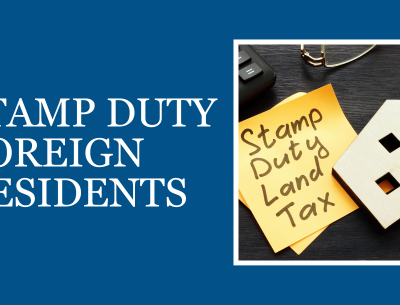
Stamp Duty Exemptions
If you are a foreign property buyer, what are your stamp duty implications?
If you are considered a foreign person and you purchase property related to residential purposes in New South Wales (NSW), you may be subject to the Foreign Buyer Surcharge. The Foreign Owner Surcharge is not the same as stamp duty; it is an additional fee imposed on foreign individuals or entities in addition to the regular stamp duty. Currently, it is calculated at 8% of the dutiable value (the higher of the purchase price or property value) and is an extra cost you would need to pay.
However, if you (as an individual, not a company or trust) purchase residential-related property in NSW and intend to use it as your primary residence, you may not have to pay the Foreign Buyer Surcharge if you meet one of the following conditions:
- Australian citizen
- Usually residing in Australia
- A permanent resident who meets the residency requirements
- Holding a spouse (temporary) visa (309 or 820) and meeting residency requirements
- Holding a retirement visa (405 or 410) and meeting residency requirements
- A citizen of a country exempt from the Foreign Buyer Surcharge due to international tax agreements, currently including New Zealand, Finland, Germany, India, Japan, Norway, South Africa, and Switzerland.
However, being a permanent resident or holding a similar type of visa does not automatically exempt you from the Foreign Owner Surcharge. You would need to meet and satisfy one of the following 200-day exemption conditions:
- Residing in Australia for 200 days within the 12 months before signing the contract (paying the deposit and signing the contract). This does not need to be continuous; you can travel within and outside Australia during this time.
- Residing in the property for 200 continuous days within 12 months after signing the contract. This must be continuous. It is calculated from the contract signing date, not from settlement, so it does not apply to cases where property purchase plans change unexpectedly.
Related Cases:
Aparekka v Chief Commissioner of State Revenue [2022] NSWCATAD 333
In this case, a married couple purchased a family residential property in October of the same year they got married in August 2020. One of the spouses was an Australian citizen, and the other held a 482 visa, which was later granted a spouse (temporary) 820 visa in October 2021. In August 2021, they received a bill for the Foreign Buyer Surcharge. Although the bill was addressed to both spouses, it explicitly stated that the party holding the 482 visa at the time of property purchase was liable for the additional property tax. The Foreign Buyer Surcharge applied to a 50% share of the property. The decision did not exempt foreign persons from paying the Foreign Buyer Surcharge, nor did it shift the responsibility to Australian citizens, as the bill only taxed the dutiable value of the foreign person’s share in the property.
Frietman v Chief Commissioner of State Revenue [2022] NSWCATAD 265
In this case, the buyer signed a property purchase contract in February 2017. Although the buyer was a permanent resident, they had only resided in Australia for 114 days within the 12 months before the contract signing date, not meeting the 200-day residency requirement. Despite residing in Australia for 245 days in the 12 months before paying stamp duty, the obligation to pay the Foreign Buyer Surcharge had already arisen at the time of signing the property purchase contract. According to the Stamp Duty Act 1997 Section 104J, the buyer was considered a “foreign person” on the day of signing the property purchase contract.
If you are eligible for an exemption, what should you do?
Revenue NSW has indicated that they will contact affected individuals. However, if you believe you are eligible for a refund but have not received any communication from Revenue NSW, we recommend reaching out to them directly or seeking legal advice to represent you in communication with the revenue department.
If you have questions about eligibility, potential refunds, or if you or someone you know is from an affected country and qualifies for an exemption, we suggest contacting our property team.
Disclaimer: This publication provides general information of an introductory nature and is not intended and should not be relied upon as a substitute for legal or other professional advice. While every care has been taken in the production of this publication, no legal responsibility or liability is accepted, warranted, or implied by the authors or our firm, and any liability is hereby expressly disclaimed.
